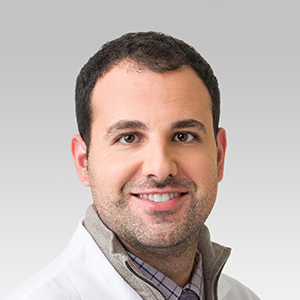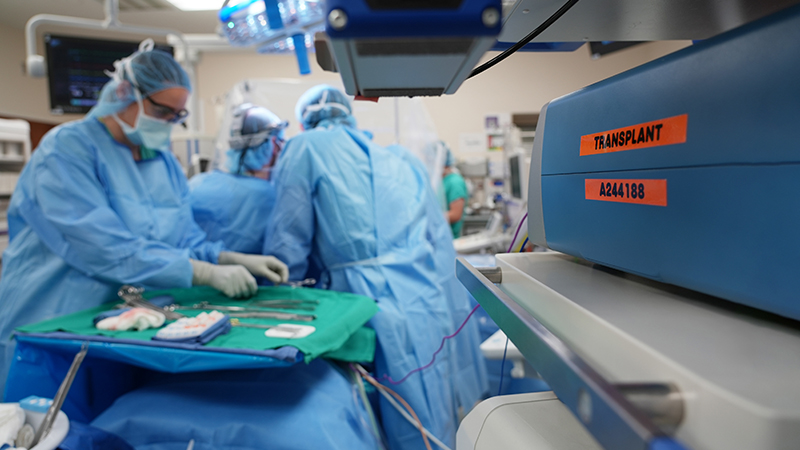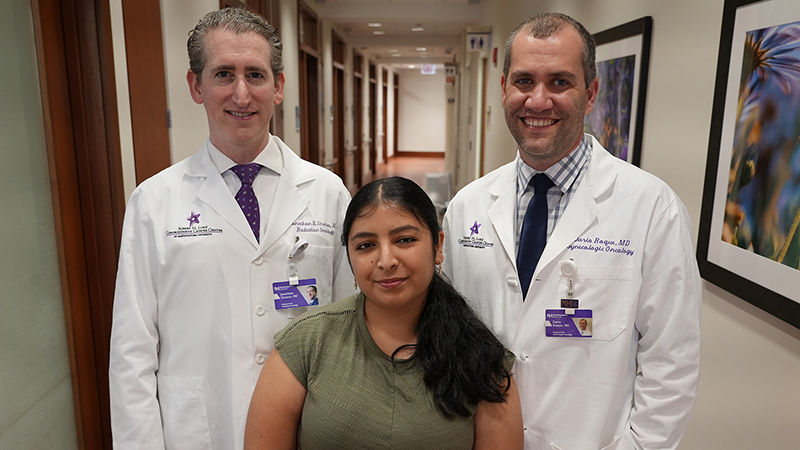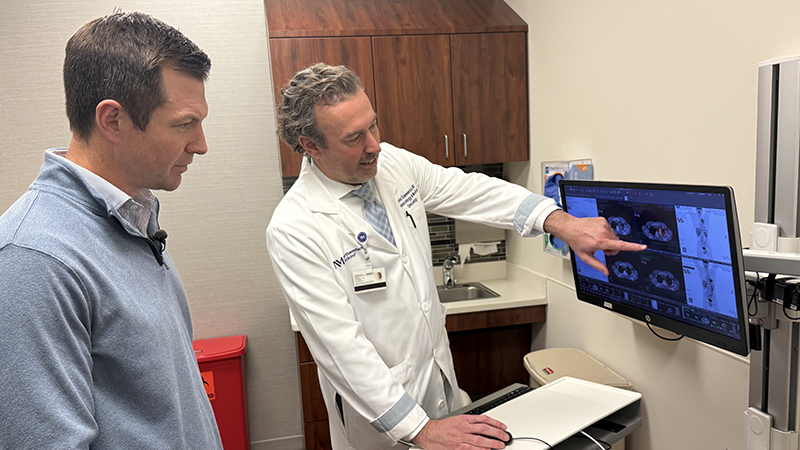Hope – And Huntington’s Disease
Published July 2019
Navigating Life After Diagnosis
At 41, Jill Briceno is in the prime of her life. There are a few truths you should also know: She is in “crazy love” with her husband of 11 years, Carlos. She has a daughter who is on the cusp of starting her career. And, as the secretary of a small private school, Jill keeps operations flowing seamlessly. She also happens to have Huntington’s disease.
Diagnosed one year ago, Jill says Huntington’s disease has taught her to live every day like it’s her last. More importantly, she’s also learned that you don’t fight Huntington’s disease alone.What Is Huntington’s Disease?
Huntington’s disease (HD) is a rare, hereditary, degenerative disorder of the central nervous system, which leads to motor, cognitive and behavioral problems. It progressively breaks down nerve cells and has no cure. Northwestern Medicine Neurologist Danny Bega, MD, who specializes in movement disorders, explains, “It strikes people in their prime of life and progresses over 10 to 20 years.”
If a parent has HD, their child has a 50 percent chance of developing it too. Jill’s father had HD, and as her father’s caretaker, she knew her risk was there. “When I was in my 30’s, I didn’t want to know,” she explains. “For most diseases, the disease takes a toll on the family as a whole, but the disease itself belongs to only one person. This is not the case with Huntington’s; the disease does not belong to just you. It belonged to your parent, and now it is possible that it belongs to your child, and possibly their children,” says Jill.
I believe we’re going to make a meaningful impact in my lifetime.— Danny Bega, MD
Because it is genetically passed down, a blood test can reveal the presence of the genetic mutation. “We look for a particular stretch of DNA that repeats itself,” says Dr. Bega. Additional testing can include a computed tomography (CT) scan and magnetic resonance imaging (MRI).
“You see it at every corner. You always wonder, but you push those feelings aside,” adds Jill. But it wasn’t until she started noticing small signs — like making mistakes at work and being stressed — that she decided to ask Carlos if other signs were there.
“I asked Carlos directly if he noticed anything,” she says. He confirmed some of the early symptoms, such as rapid eye movements and minor twitching, which for Jill presented in her toes. Dr. Bega explains, “This type of involuntary muscle movement is known as chorea, and becomes more severe as the disease progresses.”
“What Jill had tried not to think about for 20 years, what we hoped we would never experience, became cold, hard truth. My dear, beautiful, brilliant, loving, patient, insightful and hilarious wife had tested positive for Huntington’s,” says Carlos.
Life After Diagnosis
Despite her diagnosis, Jill has been a pillar of strength for those around her. Her husband shares, “Everything about Jill has inspired me. A couple weeks after her diagnosis, she told me that she accepts this. It is a testament to her strength as a woman, as someone who watched her father go through this, to say that.”
As the disease runs its course, Jill will continue to face new obstacles. “The reality is, I live each day as though it’s my last day,” she says. “I tell people I love them and am grateful for them every day.”
It is this mindset that pushes the couple forward. “I think part of her brilliance is understanding what’s important in life. Not only love, but having a sense of humor, too,” says Carlos. “I think that combination helps you navigate through this.”
However, coping with a diagnosis like HD requires support. In addition to Carlos, her daughter and her family, Jill has leaned on Northwestern Medicine to help her.
Where You Matter
Northwestern Memorial Hospital is one of few designated Huntington’s Disease Society of America (HDSA) Centers of Excellence in the country. Here, a network of specialists work together to provide a comprehensive approach to care for patients with HD. From genetic counseling to neuropsychiatric care, the goal is to manage symptoms and improve quality of life for individuals with HD. Part of this includes providing education and support to both patients and their family members and caretakers.
“We really discuss all aspects of the disease with Jill,” Dr. Bega explains. “The first visit is always anxiety-provoking, but it’s rewarding to see improvement in how someone feels over time.”
“I feel like I matter,” says Jill. “They’re super empathetic and take the time to show you matter.”
The opportunity to show this level of support and compassion is what drove Dr. Bega to specialize in movement disorders. “This is part of the disease where you are part of the person’s life,” he says. “You’re dealing with intimate things that affect the quality of their life, and that’s important to me. We’re able to make a difference, whether it’s improving walking, mood or educational assistance.”
Dr. Bega is confident that in his lifetime, great strides will be made in treating HD. “Because it’s a disease that we know and can identify exactly what causes it, I actually believe we’re going to make a meaningful impact in my lifetime,” he says. “I truly believe this will be treated differently and impact the course of this disease.”
Research continues to evolve, and exciting disease-modifying medications are on the horizon, he says. “There’s a worldwide trial of an exciting drug targeting the production of the protein that causes Huntington’s disease,” Dr. Bega explains. “If you can fix the formation of the mutated protein in Huntington's disease, you can slow the progression of the disease.”
If HD runs in your family, you don’t have to face it alone. Jill has the Northwestern Medicine Huntington’s Disease Clinic in her corner.
“Everyone ― the entire team ― seems to be there like it’s their goal to find a cure too,” Jill says. “You can feel that they want that for you.”






